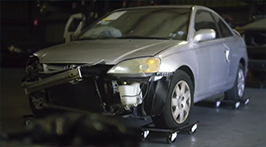A syringe is a simple medical device consisting of a glass or plastic vial with a plunger on one end and a hypodermic needle on the other that allows medication to be administered to a patient intravenously, intramuscularly, or subcutaneously (under the skin). The majority of the syringes that are used within the medical community are comprised of a plastic vial with a rubber plunger and a relatively long needle. Insulin syringes used by diabetics are notably different in that they have more slender plastic vials and significantly shorter metal needles, since insulin shots are delivered just under the skin rather than directly into the muscle tissue.
Common Uses of Syringes
The most common users of syringes are diabetics who rely on regular shots of insulin. Diabetics use syringes that are specifically designed for injecting insulin, and unlike other syringe users, diabetics regularly reuse the same needle, which is a safe medical practice as long as only one patient is using each needle. However, mass-produced plastic syringes are not without defects, and there have been a handful of large recalls of insulin syringes. Other common users of syringes include patients who have chronic medical conditions that require regular injections of hormones or steroids that would be harmful to the liver or other internal organs if they were ingested orally.
Defects in Syringes
Due to the nature of the manufacturing process for mass-produced syringes, it is not uncommon for particular syringe models to be discovered to be defective long after they are on the market, and defective syringes can potentially be quite dangerous to patients. One of the more common defects found in medical syringes occurs when the needle becomes detached from the syringe during use. This can lead to any number of complications, including a patient receiving an incorrect dose or the loss of a patient’s medication when there is not a back-up supply of medication available to the patient. Some of the most serious manufacturing defects occur while the syringes are being packaged, and it is possible for different sized syringes to be mislabeled or marketed in emergency kits that may break during shipping.
Complications and Recalls of Defective Syringes
As mundane as the common medical syringe may be, the results of using a defective medical syringe can be devastating. In recent years, there have been cases of entire lots of syringes being shipped that contain mislabeled packaging, a mistake that could result in a debilitating or deadly overdose if a patient or health care provider uses the syringe without realizing that it is an incorrect size. Needles that come loose from syringe vials have caused nerve damage when they have become lodged in the body and have also caused complications due to inaccurate dosing.
Another dangerous complication caused by defective syringes comes in the form of syringes that are pre-filled with medications. These syringes can sometimes become contaminated during the manufacturing process. The Centers for Disease Control and Prevention made a discovery in 2007 that all lots and sizes of the pre-filled heparin and saline syringes distributed by B. Braun and Sierra Filled Inc. were possibly contaminated by the bacteria strain Serratia marcescens, which could cause a bacterial bloodstream infection. This prompted a swift class 1 recall from the FDA, the most serious type of recall that the federal agency can issue.
Similar manufacturing issues have caused numerous companies to recall defective syringes after they have been on the market for some time. For instance, Tennessee-based manufacturer Smith and Nephew Inc. was required to recall the Caption Disposable Platelet Concentrator Kit after it was discovered that the syringe in the kit could possibly break if exposed to low atmospheric pressures during shipping. This recall preceded any unfortunate injuries to the public but could have caused complications if an individual opened the kit to find a broken syringe under pressing circumstances.
Insulin Syringe Recalls
In November 2008, Tyco Healthcare Group issued an immediate recall for their ReliOn 1cc 31-guage insulin syringes due to the discovery that the syringes had been packaged with labels that would cause patients to self-administer insulin shots that were 2.5 times stronger than intended. In this case, the manufacturer was not alerted to the mistake until nearly 475,000 individual syringes had already reached the Walmart and Sam’s Club stores that carry the ReliOn brand. At the time of the recall, Tyco Healthcare Group and the FDA had already received a report of one serious insulin overdose due to the mislabeling.
In October 2009, the FDA announced a mandatory recall of all Accusure insulin syringes made by medical device manufacturer Qualitest Pharmaceuticals. This comprehensive recall included all models and lot numbers of the syringes that had been released to the market between January 2002 and October 2009. The recall was announced following the discovery that the needles in Accusure insulin syringes could come loose from the insulin vial during use, leaving the needle stuck in the arm of a patient or allowing the needle to fall back into the vial itself. Due to the reliance of many diabetics on a proper dosage of insulin at the correct time, the dysfunction of a defective insulin syringe under certain circumstances could potentially cause serious complications if a patient was unable to reach a functioning syringe in a timely manner. Given the size of the Accusure brand’s share of the insulin syringe market, this recall is one of the largest mandatory syringe recalls in the history of the FDA.
Sources:
